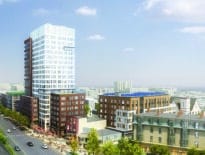
Lydia Edwards
On June 19, or Juneteenth, a little over a year after I proposed a zoning amendment to codify equity into our laws, the city of Boston made history. The administration agreed to amend the zoning code to add an equity analysis into planning initiatives and development review. This amendment will be the first of its kind in the nation and marks a historic step towards healing the pain caused by past zoning decisions.
We can see the power of zoning by studying its past. Zoning has historically been used as a tool of exclusion and to cause harm to certain communities. The effects of zoning decisions are clear when we look at which communities were split by highways, where polluting buildings were allowed or not allowed to be built, and which communities have access to transit. Zoning language was carefully crafted to determine the kinds of people who would be able to live in a particular city or a particular area of a city and has contributed to entrenched residential segregation.
These intentional decisions show which communities were valued or not valued and caused inequities in wealth, health outcomes and job accessibility that persist to this day. With this zoning amendment, Boston will be the first city to use the power of zoning to create economically and racially diverse communities.
Seaport Demonstrates Need
To understand why this is needed, we can look to a recent development process that largely ignored fair housing principles: the Seaport.
This downtown neighborhood does not reflect the values of “creating communities that are economically and racially diverse” as outlined in the Imagine Boston 2030 plan. Instead, developers created a neighborhood that caters to small, higher-income households that are far whiter and younger than Boston as a whole. While 22 percent of Boston households include children, only 6 percent of households in the Seaport include people under the age of 18. And despite the fact that almost one-third of Boston residents are foreign-born, only 18 percent of Seaport residents were born outside the US.
These statistics show us the need to go beyond non-discrimination. Our current laws already prevent developers or landlords from discriminating against potential tenants based on things like their sex, race, age, and whether or not they have a disability. And yet in the Seaport we still ended up with a neighborhood that does not reflect the diversity of our city. It’s hard not to look at the Seaport from East Boston across the harbor and wonder what it could look like if we had taken efforts during the planning process to ensure that seniors and families were able to live there. If we don’t plan for it, it won’t happen, and the Seaport shows we must be intentional in planning for equity.
What Will Be Required
Although we still need to finalize the details of the amendment, we’ve agreed to an overall framework: We will amend Article 80 of the zoning code to codify efforts to affirmatively further fair housing.
Currently, the Article 80 review process has procedures to study the impact of projects on transportation, the public realm, the environment and historic resources. The city requires developers to analyze how their projects will impact these things and “[propose] measures intended to mitigate, limit, or minimize” negative impacts before approving their plans.
With this amendment we will require developers to analyze the accessibility of their project for people with disabilities, seniors, low-income workers, as well as other protected classes and similarly show how they intend to mitigate, limit or minimize any negative impacts in order for their projects to be approved. Developers will be required to show that they are doing more than not discriminating and are being intentional about providing housing to these groups before being allowed to build.
While we have not yet finalized the implementation process, examples of fair housing measures include requiring senior housing to ensure residents can age in place, building larger units for families, making a home for those being displaced in a neighborhood, making sure the project includes small local businesses to prevent commercial displacement and ensuring equitable access to utilities such as water and internet.
With this amendment, Boston is showing for the first time how zoning can be used as a source of healing and integration instead of pain and segregation and is setting a standard for other cities in the country to follow. Once the amendment is approved by the zoning commission this fall, we will begin building a more diverse and accessible city one project at a time.
Lydia Edwards is the city councilor for Boston’s District 1 and formerly the deputy director of the Mayor’s Office of Housing Stability.






